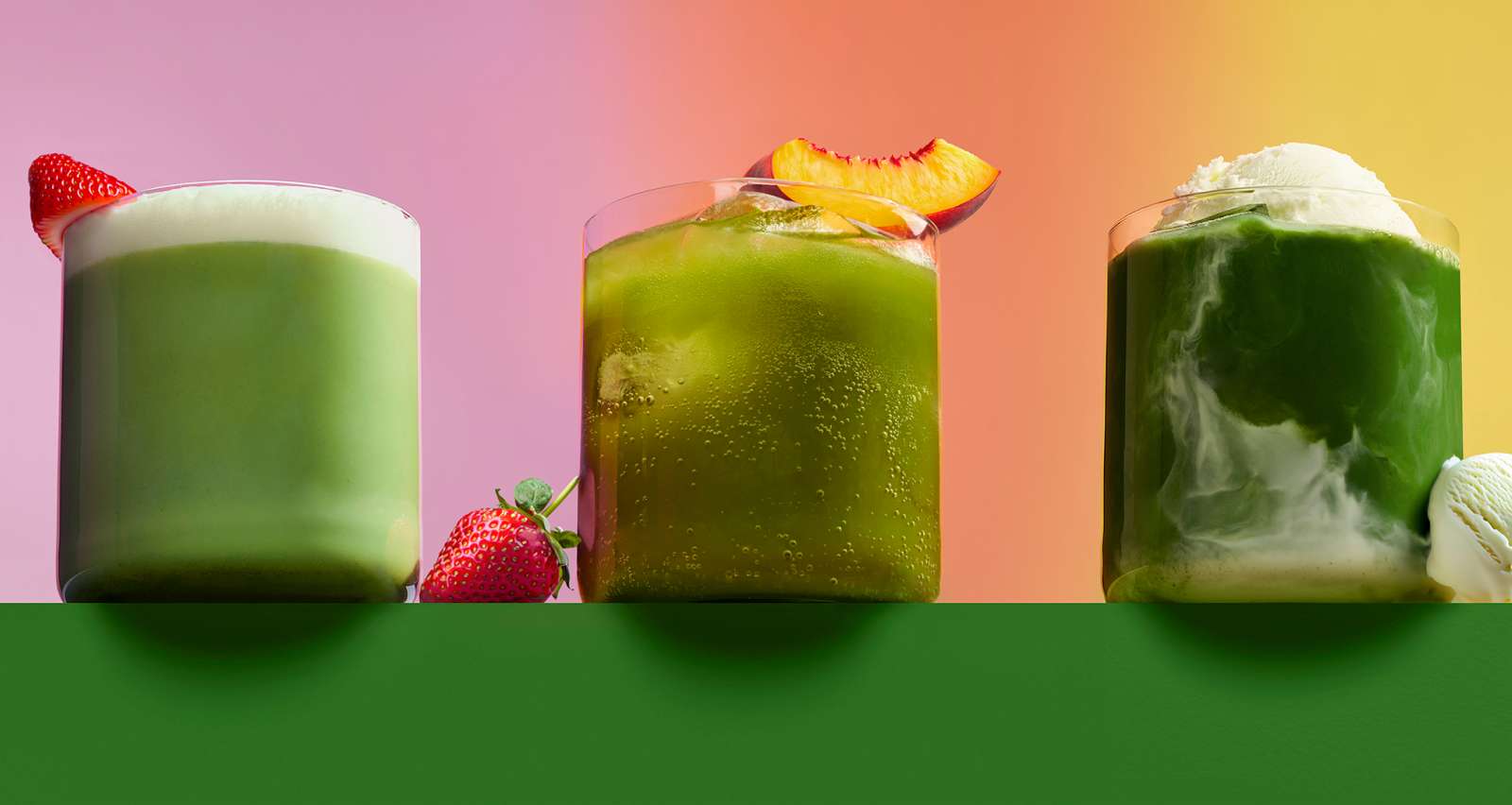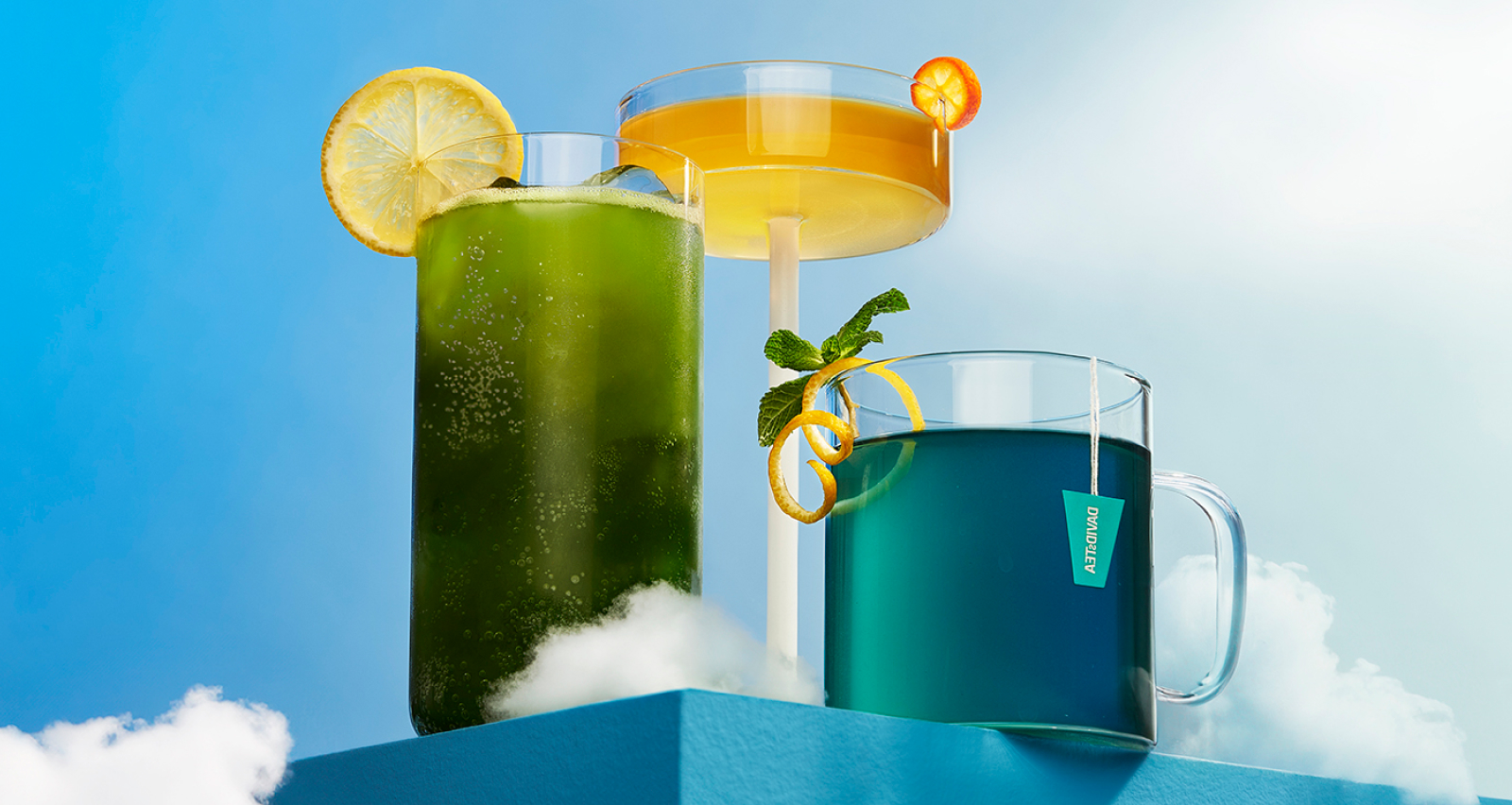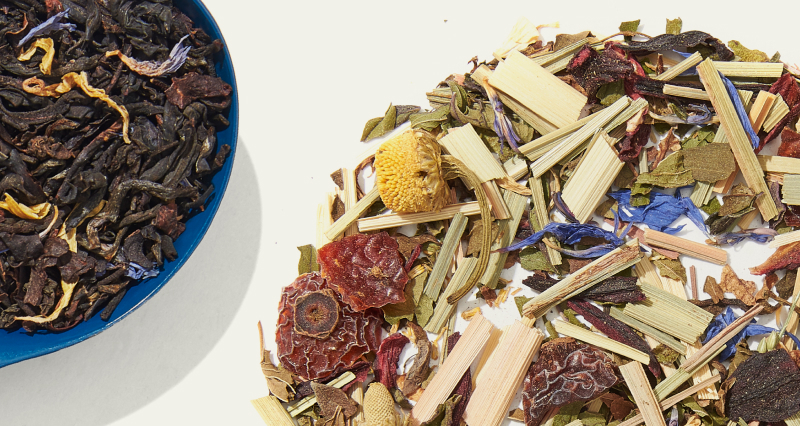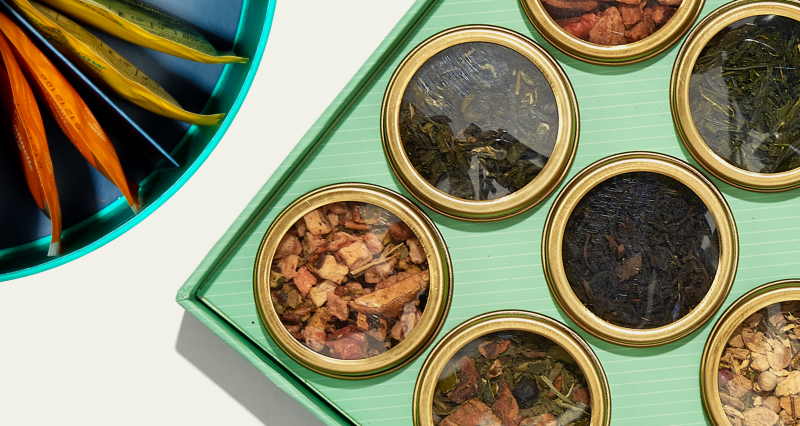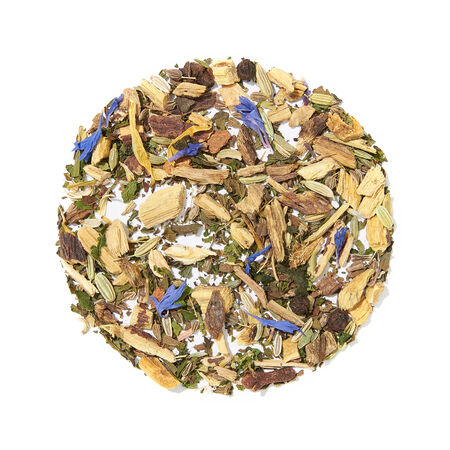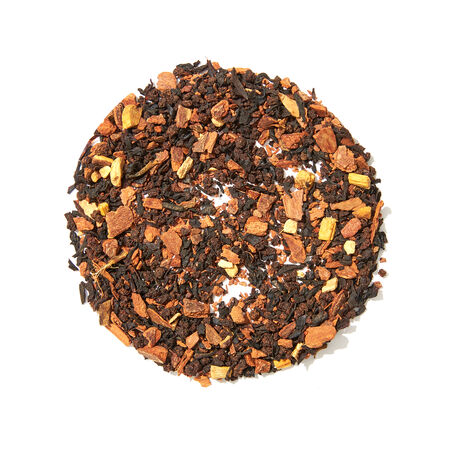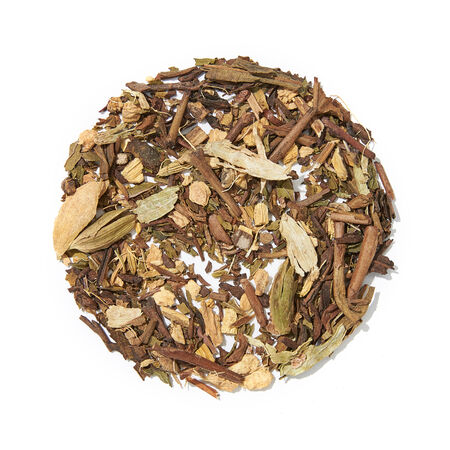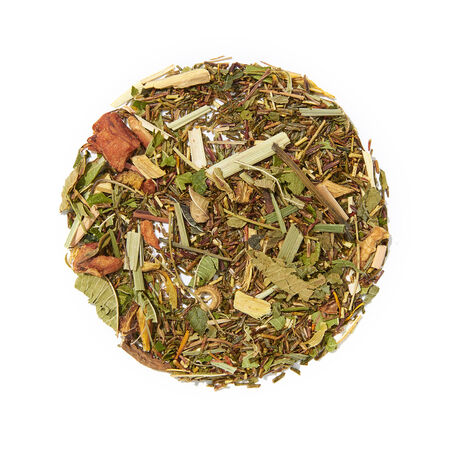season 2 | ep. 4
licorice: love it
or leave it
with Celia Aceae

steeping together podcast
- season 2 | Ep. 4
licorice: love it or leave it
with Celia Aceae
episode transcript
Marika de Vienne 0:18
Welcome everyone to a special mini episode of Steeping Together, where we explore a specific topic within the vast world of tea with a tea enthusiast. I'm your tea-obsessed host Marika and today's going to be interesting. So, there are thousands of ingredients one can use when steeping the perfect cup. From herbs to spices, sugars to milk, there is no shortage of fascinating ingredients that are added to one's cup to enhance that perfect sipping session. It's almost impossible to know where to start. So today I let our resident ingredient expert Celia Aceae pick an ingredient that she feels very strongly about in order to get our series of episodes regarding ingredient deep dives started. She's super passionate, and love it or hate it, I think most people have an opinion about this ingredient as well. So let's get this thing started. Hey, Celia!
Celia Aceae 1:15
Hi, Marika. That's well said, I think I would agree with you.
Marika de Vienne 1:20
Alright, so Celia, for anyone who would have missed your previous interviews on Steeping Together, who are you?
Celia Aceae 1:28
Well, I'm Celia. I am a Tea and Sustainability Specialist here at DAVIDsTEA and I am passionate about all things plants. I have a background in conservation and horticulture and both of those things led me to tea as well, because tea is just plants. And when I look at an ingredient in a tea, I really want to know every single thing about it. I want to know what family it's in, what genus it's in. I want to know what other plants it's related to, how their benefits can be similar, how they affect our palate, how they affect our stomachs, how–you know, every single thing about that ingredient I want to know and that's how I treat every single tea. So when you asked me to choose an ingredient for this podcast, I was pretty excited because in my spare time, believe it or not, one of the things that I spend the most time thinking about is, if I were trapped on a desert island, what five–and I could only have five plants with me–what five plants would those be? And you know, sometimes it changes depending on something new that I've learned, something that I'm really passionate about in the moment, but one thing is certain. Licorice root is always in that list.
Marika de Vienne 2:41
Wow! Really?
Celia Aceae 2:43
Yeah, it is.
Marika de Vienne 2:44
That's fascinating to me because, I think a lot of people, like I said at the top of the episode, have a love it or hate it relationship with licorice. And I love true licorice. I hate false licorice. So I think it's really important that we start there because these are two completely different things.
Celia Aceae 3:09
You nailed it right off the bat. So often when I say I love licorice root, people get this look on their face. They look so disgusted and then I have to say no, no, wait, what you're thinking of, you know that licorice flavour is not licorice root. So originally, yes, licorice root was maybe used to flavour a lot of licorice products. But recently, as a society, we've moved to using anise to flavour licorice products. So when you taste something and you're like, I don't like licorice, most likely you don't like anise, and it's maybe time to give licorice root another try.
Marika de Vienne 3:47
Right, right. So just so everybody, we're on the same page here, as a child I had like a piece of black licorice candy and was revolted. And that continues to this day. Like I see like a black jelly bean. I'm like, no, no, thank you, I’m good. This is–it's so intense, and it's so overwhelming. And some people love it. I mean, some people love that and there's nothing wrong with those people by any means.
Celia Aceae 4:15
I mean yeah, I like licorice root, but I also love black licorice, right? I come from a Dutch family. My mom used to bribe me to play my violin with dropjes, Like the salted black licorice. So like…
Marika de Vienne 4:27
That’s a story for a whole other episode. I love it. I love it. I need more details.
Celia Aceae 4:33
I love black licorice, but I don't think of it as the same thing at all.
Marika de Vienne 4:38
Right! And when I was maybe 16 or 17 I was given like a licorice stick and when I mean licorice stick I mean a branch, I was given a branch of wood.
Celia
A root. Yeah.
Marika
I was given a root! Well, what I saw was a stick, so yes a branch. And I was like, what is happening? Yeah, to your point later on I discovered like it's actually a root, and when you chew on it it's radically different from anise or black licorice candy. Can you like describe this flavour because it's so unique?
Celia Aceae 5:11
Yeah. So licorice the plant, the scientific name is Glycyrrhiza glabra. And there's a component in this plant… Background, the plant is in the pea family, Fabaceae, it's like related to peas and beans, which is pretty interesting to me. Maybe some of you out there as well. And there's a component in this plant that's called glycyrrhizin, which comes from the scientific name of the plant itself. And that component is said to be 50 times sweeter than sugar. So it's a very sweet flavour that you're getting. And it's one of the reasons why a lot of kids actually really like it. Because you're like chewing on this very sweet thing. It's pretty fun. And it's usually the root that you're getting. And it's one of the reasons why we use it in tea so much! Because we love to find things that add natural sweetness to our cups of tea, and why not use it here. And the other thing that you're going to be finding when you suck on that, or when you chew on that root, is that you get kind of like a, a film, it's gonna be kind of like, slippery or soft, you know. And that's because licorice root is something called a demulcent. So a demulcent is kind of like adds, how could I describe this, like something very, like it kind of intensifies the film in your mouth, you know, you have saliva, and you have that, that feeling. And licorice root is actually helping add to that. If it's damaged, it can help repair that. So it's one of the reasons why it feels so good. If you have a sore throat and you drink something that's really high in licorice root, it's going to feel amazing, because it's that coating feeling that's covering your throat. And if you have an upset stomach, you're going to be experiencing a very similar thing because guess what your stomach lining is also made up of that like film and you want to be helping it out when you have an upset stomach. So it's one of the reasons why licorice root is one of those ingredients that I just reach for all the time no matter what my symptom. If I have a sore throat, if I have a runny nose, if I have an upset stomach, I'm reaching for it. And it's my BFF you know? It’s there.
Marika de Vienne 7:22
Your description was so perfect because it coats your mouth, it is a film. I'm gonna be totally honest with you Celia, that description sounded gross. Like it sounds nasty, but like, you're so right, because when I eat a licorice stick, or have a licorice, a pure licorice infusion, it coats my whole mouth. I don't associate it with the word film and I'm really gonna have to purge that word from my mind now…
Celia
Yeah, ok. Sorry!
Marika
It’s fine! No, because it's accurate. I mean, you what you were giving was a very extremely accurate description of what it does, because it does coat your mouth. And sometimes for the people who don't like real licorice, they don't enjoy that sensation. It's very rare that people don't enjoy the flavour because it's just a natural sweetener, but a lot of people don't enjoy that sensation. They don't like the fact that their whole mouth is now encompassed with the sensation. To me, it's a very soothing, comforting sensation.
Celia
I agree.
Marika
And what you said is true, it goes into your throat so if you have a sore throat your best friend is licorice, it really is because it kind of protects you from that dry, scratchy feeling. And if you have an upset stomach, it really just kind of, it's kind of like a comforting hug for your tummy. It's almost like, you're gonna be okay, we're getting through this, just calm down I'm going to coat you and that's just going to soothe it just enough for you to get better on the other side. It's one of the few ingredients that I've ever had to describe, like, in that amount of detail because usually we talk about like, well you talk about the genus. I've never attempted Latin, ever. But we talk about the flavour, we talk about why we like it, but with licorice you can't get away from its effect on you. There's just no–everybody feels the sensation when they eat it or drink it or steep it.
Celia Aceae 9:14
Yeah, I love it because you just know that it's working immediately. You just take your cup of licorice root tea and you drink it and you feel that sensation immediately. And it's funny that you said like, the word film maybe wasn't the best word. I was kind of trying to steer clear of like the words mucous membrane, and now I'm saying them so we're going to there.
Marika de Vienne 9:33
Cat’s out of the bag, mucous membrane, everyone!
Celia Aceae 9:36
Yeah, you’re relieving the irritation of your mucous membrane when you drink ingredients that are demulcent. So that is licorice root. Sometimes I think of like, oh gosh, like maybe violets. Other thing, other ingredients that have that effect, and like Linden is one of those as well. But I find that licorice root is really the first one I reach for and it's the one that I feel the most instantly.
Marika de Vienne 9:59
You said some thing that just went completely over my head. Demulce–?
Celia Aceae 10:03
Demulcent. Yes.
Marika de Vienne 10:06
Demulcent. And that reacts with the mucous membrane. Can you explain that how that works a little bit or?
Celia Aceae 10:16
Well, I guess a really good example might be okra. Have you ever cooked okra?
Marika de Vienne 10:22
I don't cook but I've eaten okra, yes.
Celia Aceae 10:25
Yeah. So when you cook it and you get kind of like that–
Marika
Slimy…
Celia
Yeah, exactly. And now just like take a moment and run your tongue over your, the sides of your cheeks.
Marika de Vienne 10:35
Mmhmm. Right, okay.
Celia Aceae 10:36
Can you feel the similarity between the two?
Marika de Vienne 10:39
Oh, now I can't unsee it.
Celia
Okay. Maybe I’m going too far!
Marika
Now every time I touch my tongue to the side of my mouth, I'm gonna think about okra. No, you’re not going too far!
Celia
And mucous membranes!
Marika
And mucous membranes. Oh, no, that illustrates it perfectly. Yeah, if I run my tongue along the inside of my cheeks, I know exactly what sensation you're talking about. Okay, so the demulcifier?
Celia Aceae 11:00
Demulcent.
Marika de Vienne 11:01
Thank you. What does that do?
Celia Aceae 11:04
Yeah, so the demulcent, like okra is a demulcent. So what you're doing is you're just helping relieve any irritation that's going on there. In some cases, it can be actually helping repare that lining. You know, it's a lot of different things that are going on. And it's pretty exciting.
Marika de Vienne 11:21
I think it's exciting. I feel like I'm either gonna feel really good when you answer my next question or really stupid. Demicent?
Celia Aceae 11:29
Okay. Demulcent.
Marika de Vienne 11:30
Why won't my brain register this information? Demulcent. Is aloe vera a demulcent?
Celia
Ooh, good question. I believe it is.
Marika
(Gasp) Yay! I mean, topical right. Where not necessarily when you like ingest it. But when you said like okra, and you said the kind of coating effect and the kind of healing effects.
Celia Aceae 11:49
Yeah, and you'll notice it like if you have a cup of Linden as well and you leave it out for the night, you might notice that it gets kind of that sticky texture.
Marika de Vienne 11:57
I’ve never done that but I’m going to now.
Celia Aceae 12:01
I mean, I always do because I only ever get through half a cup of linden tea, because I fall asleep immediately. The next morning, I'm like, hmm wonder what that tastes like. It’s a little, a little slimy sometimes. But that's just the nature of it. I know it's working.
Marika de Vienne 12:18
You do know when licorice is working. That's what's so interesting, is that with a lot of plants and herbs, I mean some things you can feel their effects immediately. Ginger for me, like as soon as I drink ginger, I feel like that heat, that burn. Especially when I'm sick it feels so good, when I'm nauseated it works almost instantly. It's one of those plants that, well roots, that works just really well for me. And licorice can be counted among that, you know, there is a sensation, there is an immediacy to it. Like I think of our tea Throat Rescue. Whenever I make a cup of Throat Rescue, I feel the licorice effect immediately.
Celia
Oh, totally.
Marika
And it's not a licorice tea. It's not tea that it like, the main ingredient is not licorice, there are other ingredients in Throat Rescue. But the thing that I feel instantly is that coating, is that comfort, is my throat immediately feels much, much better. It's a really incredible tea for its effect as opposed to its flavour.
Celia Aceae 13:19
Yeah. So we've talked about how it really, how you can see that and feel that immediately, I guess feel it immediately. But there are other things going on in the background with licorice root as well. So it is one of the best known immunity boosters. So it's the other reason why I drink it all the time if I have a little sniffle. As soon as I have a sore throat, it might help the feeling but I also know that it's helping with my immunity. And it is also a well known adaptogen. So adaptogen is a word that we're starting to see a lot more in mainstream media. And I think people are starting to use it commonly as they express themselves about plants, about ingredients that they're using to kind of help adapt to stress. So you know, we're always looking for things in this world that can help us adapt to the day-to-day stress of life, and licorice root is one of those ones that I reach for when I really need something there. That being said, it's a very strong herb. So even though I'm talking about it this passionately, it's not an ingredient I drink every day. It is like a very cause and effect herb for me. It's not something that I incorporate into my routine, because I want to be able to reach for it when I need it specifically. And as always, when we're talking about incorporating new plants into your life, we always talk about like maybe discussing with a doctor if that's what's best for you, and we always want people to feel comfortable with what they're consuming. So most importantly, we want you to enjoy your tea, enjoy the flavour, if it's not a flavour for you, that's okay. But secondly, we want you to feel comfortable with what you're consuming and what you're putting in your body. So it's always good to just check.
Marika de Vienne 15:06
Yeah, and it's a personal choice. If you don't like the sensation, don't use it. I wouldn't recommend it necessarily as a sweetener that people should add to their tea because like we do it here with our teas, because we're working really hard to create that perfect balance where it acts as a sweetener, but isn't always necessarily going to have enough within that blend to give you a strong mouthfeel. So it's not like oh, just add licorice, a branch, a root of licorice to your tea like that'll sweeten it. There will be other effects given, to the mouthfeel to the texture to the way your body adapts to it. I'm pretty sure there are people out there who must have adverse reactions to licorice, much in the same way that you can have adverse reactions to valerian as we discussed in one of our previous episodes, just because it is widely considered to be an adaptogen to stress does not mean that that's going to work for you. So like as soon as it doesn't work for you, that's okay, just stop. Give it to a friend. Well, I'm really happy that we were able to sit down and really talk about true versus false licorice. I mean, I appreciate like all of your knowledge and all of your passion for this particular topic. But I think really, we had to start by saying there is one true licorice, and it's an amazing, amazing root with so many benefits, so many textures, so much potential. And don't, if you see it in an ingredient list somewhere, don't be like me 20 years ago and be like licorice, ew, never! Because I really avoided a lot of those teas for many, many years because I just didn't like black licorice. I was like, I don't want to associate– I’m not gonna pay to have that in my cup. If you see licorice in an ingredient list, it may just be to add sweetness. It could be to help with a sore throat or a cold, it could be good for your immunity. It's a really miraculous little root, isn't it?
Celia
It sure is.
Marika
Well, thank you so much Celia. I cannot wait to hear which ingredient you want to focus on next time, because this was–when I asked you what ingredient would you like to talk about, you immediately said licorice and I was like, okay, fair enough. I'm not going to argue with you.
Celia Aceae 17:21
There are just so many misconceptions about it. And I just want everybody to know the truth, you know?
Marika de Vienne 17:27
The truth about licorice! So thanks again. And thank you to everyone for listening to today's mini episode. If you would like to reach us with comments, questions or topics for another mini episode, like what ingredients would you like us to focus on? Cinnamon, ginger, linden? The list numbers in the thousands and you can let us know by writing in to steeping.together@davidstea.com, or through our website davidstea.com. Have a great week and happy steeping everyone!
celia aceae

about the guest
Celia’s obsession with tea began as soon as she could sip. Motivated by her love of plants (and insatiable curiosity), Celia studied conservation and natural resource compliance at Lethbridge College in Alberta. She went on to obtain a Red Seal in horticulture from the Niagara Parks School of Horticulture, and currently works as a Tea and Sustainability Specialist at DAVIDsTEA. But we’re not done yet! Celia has also completed an additional bachelor’s degree of Science in Horticulture, basically proving that her love of tea and plants is no passing fancy. With an encyclopedic knowledge of plants and their various impacts on individuals as well as the planet, Celia has committed most of her time to the proliferation of tea and plant knowledge. As a trained Tea Sommelier, she brings joy to those around her by sharing a cup of tea with anyone and everyone, at any time. Fun fact: she lived in Japan for three months studying matcha production and the Japanese tea ceremony, so quiz her, she loves it!
